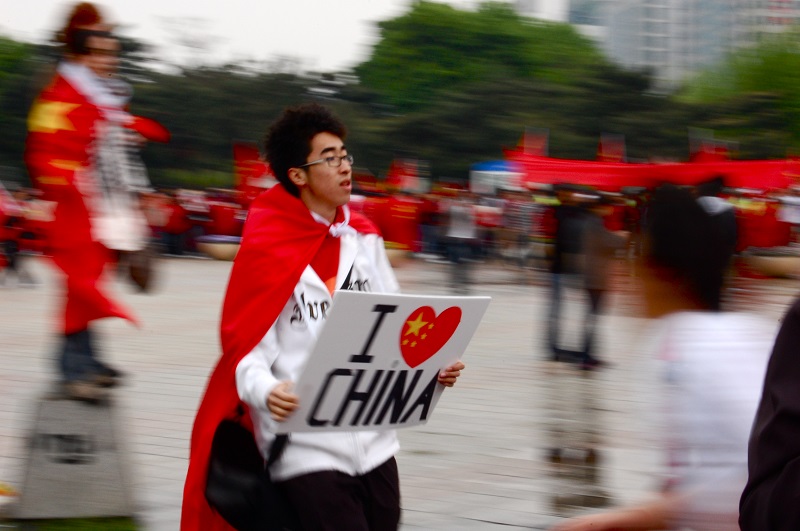With around 731 million netizens, China is home to the largest cybercommunity in the world. To prevent the Internet from being a destabilizing force, the Chinese Communist Party has famously set up the Great Firewall. But the Party also relies on a lesser known phenomenon to solidify their rule: cybernationalism. Cybernationalists are found in every corner of the Chinese Internet, shouting pro-China slogans and anti-Japanese or anti-Western rhetoric, mobilizing online and offline to defend China’s national honour at the slightest hint of national disrespect or embarrassment.
Who or what is behind the phenomenon of Chinese cybernationalism? What have the Communist Party done to impose their narrative on the Internet? And why is it that Chinese netizens have put up with, or even strongly support, what the West would consider intolerable censorship for so long?
Benson Cheung interviews Gabriel Zoltan-Johan to discuss his senior thesis research about cybernationalism in China, for which he did original data collection research. Recorded on April 24, 2017, this interview is based on his senior thesis research conducted in the first half of 2016.

Gabriel Zoltan-Johan is a graduate from Victoria College at the University of Toronto, with an Honours Bachelor of Arts. He graduated as a Specialist in Political Science, with a Minor in History, with a focus on East Asian and American politics. He is currently working at theScore as a News Editor for the growing eSports industry, and interacts with the markets in South Korea and China heavily as a result of his work. He has the goal of working on expanding his research by doing postgraduate work on big data and open data in East Asia.
Part 1: Behind the Great Firewall
Part 1 outlines the basic institutions, actors, and laws that are the backbone of the Chinese online governance regime, as well as the origins of offline and online Chinese nationalism since the 1990s. Along the way, we dispel a few myths and assumptions about how Chinese censorship works.
Part 2: Chinese Cybernationalism Takes the Wheel
In Part 2, Gabriel presents three manifestations of cybernationalism at different, complementary layers: domestic (Jasmine Revolution), economic (2016 Shanghai Stock Exchange crash), and international (Diaoyu/Senkaku Island dispute). These three cases illustrate how top-down censorship and bottom-up nationalist activism work symbiotically to stabilize and legitimize the Communist Party’s leadership for every occasion.
Part 3: Manufacturing Consent with Chinese Characteristics
In Part 3, we extrapolate the implications of the Chinese cybernationalist model for Internet governance and civic community, and the netizen’s social contract with their states. We conclude with Gabriel’s thoughts on the future of Chinese cybernationalism and some advice for students hoping to write their senior thesis.
As a special bonus, Gabriel and Benson talk about state-sponsored choice architecture in political theory.
Show notes
- China’s Internet Security Manifesto: Computer Information Network and Internet Security, Protection and Management Regulations – 1997 (alternative translation)
- Official website for the China Internet Network Information Center
- Official website for the China Internet Illegal Information Reporting Center
- Official website for the Cyberspace Administration of China
- Citizen Lab report: One App, Two Systems: How WeChat uses one censorship policy in China and another internationally (Citizen Lab, November 30, 2016)
- Interview with director Chris D. Nebe on his documentary “Diaoyu Islands: The Truth” (2014)
- Information on grassroots environmental protests in Xiamen forces local government to reverse policies in 2008:
- The Behavioural Insights Team (“Nudge Unit”), one of the pioneering cases of governments applying behavioural economics to governance
- Cambridge Analytica, a controversial data company involved in the Brexit referendum and the 2016 US Presidential Election
- Foreign Policy article “American Unrest Proves China Got the Internet Right“, by Ran Jijun (2017)
- Cereal Box Psychology
Gabriel’s Recommendations
- Guobin Yang, Professor of Communication and Sociology at the University of Pennsylvania (formerly of Columbia University)
- The Power of the Internet in China: Citizen Activism Online (Columbia University Press, 2011)
- Consent of the Networked: The Worldwide Struggle for Internet Freedom (Basic Books, 2012), by Rebecca MacKinnon
- Citizen Lab at the University of Toronto
Featured image: Love (2008), by Jordan Wooley via Flickr. Licensed under CC BY-SA 2.0.
Photo of Gabriel Zoltan-Johan taken by Benson Cheung.
Disclaimer: Any views or opinions expressed in articles are solely those of the authors and do not necessarily represent the views of the NATO Association of Canada.




